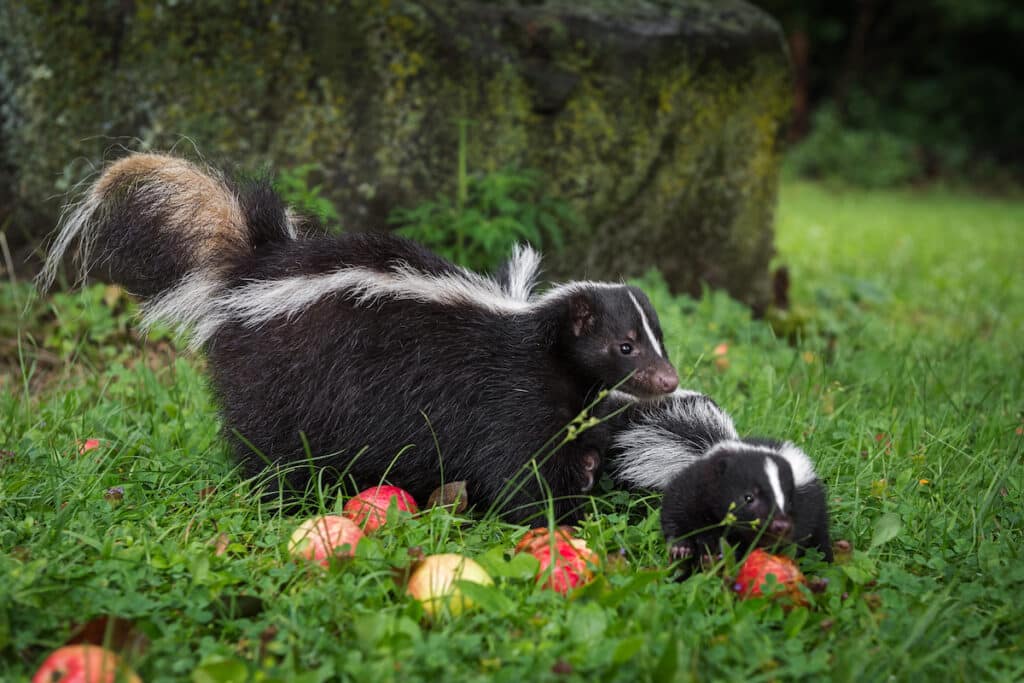Having your cat get sprayed by a skunk can be a frightening experience, and it is important to know what to do if your cat gets sprayed by a skunk. In addition to preventing the odor from lingering, you may also want to know how to treat your cat after he has been sprayed.
Symptoms of being sprayed by a skunk
Symptoms of being sprayed by a skunk can range from a minor itch to a serious illness. If you have an animal that has been sprayed, you should consult a veterinarian as soon as possible. This is because skunks carry a number of diseases, including rabies.
The symptoms of being sprayed by a a skunk will vary from one animal to another, but usually you can expect to see watery eyes, pawing at the face, and squinting. In some cases, a pet’s eyes may be temporarily blinded, while in others, the eyes may become red and watery.
The spray can linger on your clothes and skin for weeks, so it is important to wash the affected areas. Skunks can enter your home through open garbage containers, unfenced yards, and compost piles. If you see skunks in your home, call your local animal control officer and health department.
Skunks also carry rabies, Q-fever, leptospirosis, and tularemia. Skunks are nocturnal animals and are usually active during the night. The skunk’s spray is extremely foul, so it can cause problems for people with respiratory ailments.
Treating your cat if they smell like a skunk
Getting your cat sprayed by a skunk can be very scary. A skunk can be a dangerous animal and can carry infectious diseases. It can also cause anemia in your cat if the spray gets into the bloodstream. This is why it is important to take steps to prevent a skunk attack.
The best way to treat your cat if they have been sprayed by a skunk is to get them to the veterinarian as soon as possible. Your veterinarian will be able to sedate your cat and bathe them for you. It can also be helpful to get a booster shot for rabies to ensure that the cat does not contract the disease.
You can also use a home remedy to remove the odor. This can be done using a mixture of hydrogen peroxide and baking soda. This solution can be applied to your cat’s coat, but should not be used on the face.
Preventing skunk odor from sprayed clothes and fabrics
Getting rid of skunk odor from sprayed clothes and fabrics can be a tricky task. The smell is strong and can linger on fabrics for weeks or months. However, there are a few things you can do to eliminate the smell and prevent it from coming back.
You can start by washing the affected clothes or fabrics with a good laundry detergent that contains antibacterial ingredients. The detergent will cut the oil in the fabric and remove the odor.
You can also use baking soda and hydrogen peroxide to remove skunk odor. But be sure to follow the directions on the fabric care label. For example, you don’t want to wash delicate fabrics with hydrogen peroxide. It can bleach the fabric and discolor it. You also don’t want to use this solution on fabrics with heavy scents.
A good alternative to hydrogen peroxide is vinegar. Vinegar has an antiseptic property and is also effective in removing skunk odor. It can also be used to clean upholstery and carpets.
Treating rabies from a skunk attack
Depending on the severity of your skunk bite, you may need to consider a treatment for rabies. This is a viral disease that attacks the central nervous system (CNS) and is fatal. It is also a very painful condition.
Usually, the first sign of rabies is a change in an animal’s behavior. In some cases, the animal may appear affectionate. In other cases, the animal may attack anything in its path. You should contact your health care provider or a veterinarian to determine whether you have been exposed to rabies.
The rabies virus is carried by warm-blooded mammals such as cats, dogs, rabbits, raccoons, and skunks. It is transmitted through bites or scratching from infected animals. If an infected animal bites you, contact your local health department or animal control officer for treatment for rabies.
If you are bitten by a wild animal, you should not attempt to destroy the animal’s head. This is because the saliva of the rabid animal can enter your wound and spread the disease.














